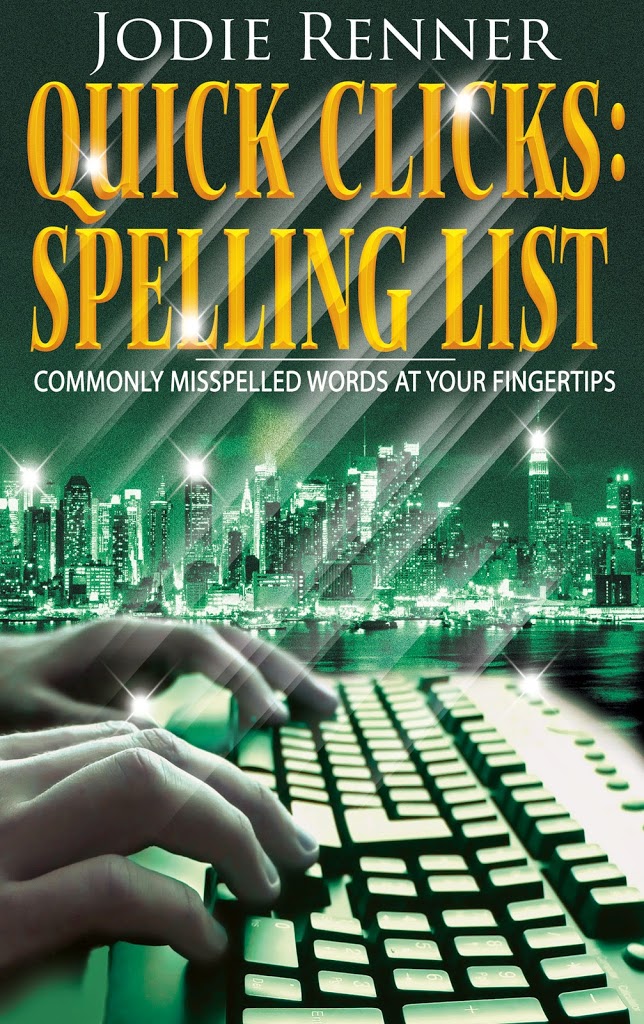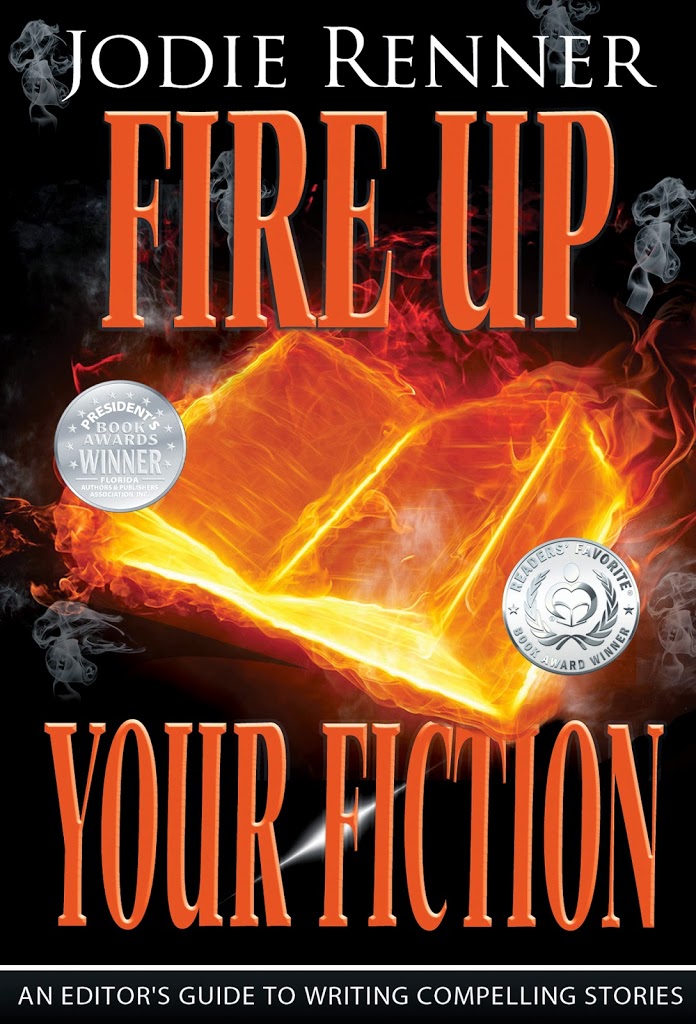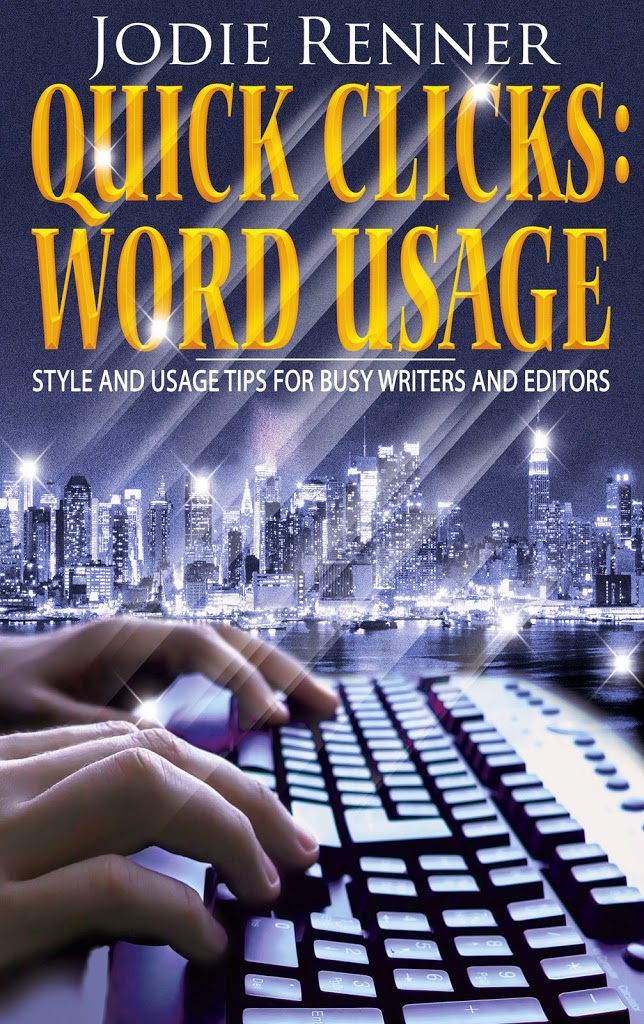by Jodie Renner, editor and author, @JodieRennerEd
How are your word usage and spelling skills? Try this quiz to find out.
Would you say, “Please join Kerry and me” or “Please join Kerry and I”? Do you lay down or lie down for a nap? Should you rein in or reign in your impulses? Did chaos rein or reign in the classroom for the student teacher? The homicide detective arrived at the scene of the grizzly (or is it grisly) murder. How did that effect (or is it affect) you? What was the effect/affect of that show on your kids?
Did the elicit or the illicit lovers have a discrete or discreet rendezvous? Do you insure, ensure, or assure that your seat belt is fastened? Do you hone in or home in on a problem? Do you say “He got his just desserts” or “He got his just deserts”?
Which is correct, “between you and me” or “between you and I”? Do you peak at a mountain peek or vice-versa? And do those juicy bits of gossip peak your curiosity or pique your curiosity? Do you pore over or pour over the details of a document? Did the singer damage her vocal chords or vocal cords? What’s the difference between continual and continuous? allusion and illusion? aural and oral? idyllic and ideal? further and farther? a gourmet and a gourmand? fictional, fictitious, and fictive? jibe and gibe? e.g. and i.e.? bizarre and bazaar?
What are the main differences between American and British spelling? Do Canadians use British or American, spelling, words and expressions? And what the heck is “codswallop”?
And for you fiction writers, what are the word length guidelines for flash fiction, short short stories, short stories, novelettes, novellas, and novels? What’s the difference between an antagonist and an antihero? What’s a crucible in fiction? How about dramatic irony? How is a metaphor different from a simile? What’s a McGuffin?
Scroll down for the answers to most of these questions, and you can find the rest and many more in my handy, clickable, time-saving – Quick Clicks: Word Usage – Style and Usage Tips for Busy Writers and Editors.

This e-resource and my Quick Clicks: Spelling List – Commonly Misspelled Words at Your Fingertips are also available as PDFs for $2.99 (or both for $4.99) through me, at info (at) JodieRenner (dot) com.
Both of these e-resources for writers, editors, proofreaders, and anyone with a writing project on the go have an alphabetical “Key” of clickable groups of letters, like ca ce ci ch cl cr etc. at the beginning, to click on to quickly find words starting with those two letters. Then on each page you click on “Home” or “Back” to get back to the KEY to quickly find another word.
Some excerpts from Quick Clicks: Word Usage, mostly in alphabetical order:
affect; effect – affect (verb) means to influence or have an effect on: “The state of the economy affects businesses.” Effect (noun) means a result: “A cooperative, friendly work environment has a positive effect on staff morale.” A good way to remember the difference is that affect starts with an “a” just like “action” and it’s an action verb; whereas effect is usually a noun. (However, effect can also be used as a verb, meaning to cause, to make happen, produce: “The new president will effect many changes.”)
allusion; illusion – an allusion in an indirect reference to something: “The boss made an allusion to Peter’s earlier career during his evaluation.” An illusion is a misconception, unreal image, or false impression: “Peter had no illusions about how tough it was going to be to meet his employer’s expectations.”
“and me” or “and I”? – Is it “Frank and me worked on that project last week” or “Frank and I worked on that project last week?” Is it “Save seats for Carole and I” or “Save seats for Carole and me”? Here’s a little trick that always works for these cases: Take out the other person’s name and the “and.” If what you’re left with makes sense, that’s the word you need in the original sentence, including the other person. Would you say “me worked on that project”? No, so it’s “Frank and I worked…” Would you say “Save a seat for I” or “Save a seat for me”? You’d use the “and me” there, so add back the other name and it’s “Save seats for Carole and me.”
assure; ensure; insure – assure means to give confidence to or put someone’s mind at ease, as in to assure your child you’ll be home soon; ensure means to make certain, as in to ensure you take precautions; insure means to guarantee against loss, as in to insure your car. “Brent assured her that insuring her possessions now would ensure she would be reimbursed for lost or stolen items later.”
aural, oral – aural means of or relating to the ears or to hearing; oral means of or relating to the mouth or speaking. Not usually an issue, but apparently when “the pill” was first introduced in the early 1960s as the first oral contraceptive, some women reportedly mistook “oral” for “aural” and stuffed pills into their ears! (Thanks to Garner for this little anecdote – whether it’s actually true or not!)
between you and me is correct – never “between you and I.”
bizarre; bazaar – bizarre means strange, startlingly odd; bazaar is a market.
chord; cord – chord is reserved for music; cord = string, rope; a measure of wood; ribbed fabric; and vocal cords
continual; continuous – continual = frequently occurring, intermittent, as in continual complaints; continuous = nonstop, occurring without interruption; unceasing, as in a continuous siren
deserts, desserts – deserts = something someone deserved – “He got his just deserts.” desserts = sweet choices for at the end of a meal. (And then there’s deserts, arid regions with very little rain.)
e.g., or i.e., – i.e., means “that is”; e.g., means “for the sake of example” or “for example.” i.e., specifies or explains; e.g., simply indicates an example. Note that both have two periods and both are followed by a comma. Chicago style is to use these two-character abbreviations only within parentheses or in notes; in regular prose, use “for example,” or “that is,”
elicit; illicit – elicit (v) = to draw out an answer, information, etc. (elicit an apology); illicit (adj) = illegal (an illicit scheme)
em dash (—) Longer than an en dash (–), which is longer than a hyphen (-), used within words. To make the em dash, click on Ctrl+Alt+minus (far top right, on the number pad).
en dash (–) Ctrl + minus sign (far top right, on the number pad). Often used in nonfiction, with a space on either side of the dash. Fiction tends to use the longer em dash (—) instead, with no spaces on either side.
farther; further – farther is mainly used for physical distances; further is for time or quantity. “He lives about three miles farther down this road.” But “We need to look into this further.”
fictional; fictitious; fictive – CMOS: fictional means “of, relating to, or characteristic of imagination” (a fictional story); fictitious means “imaginary, counterfeit, false” (a fictitious name); fictive means “possessing the talent for imaginative creation” (a fictive gift)
gibe; jibe – gibe = a biting insult or taunt: “The angry crowd hurled gibes as the handcuffed suspect passed.” jibe = to fit or coincide – “The conclusion didn’t jibe with the facts.”
gourmet; gourmand – gourmet = one who knows and appreciates the fine points of food and drink; gourmand = one who is excessively fond of food and drink, glutton
grisly; grizzly; grizzled – grisly = gruesome, horrible, as in “grisly details”; grizzly = species of large bear, also grayish; grizzled = gray hair or beard.
him and me; he and I – Use “him and me” for object (receiver) of the action: They invited him and me to the reception. Use “he and I” for the subject (doer) of the action: “He and I arrived at 7 p.m.” If in doubt, just use one of the two persons to try it out. Would you say “Him arrived”? or “Me arrived”? No, so it’s “He and I arrived.” Would you say “They invited I”? No, so it’s “They invited him and me.” Same applies to she and I vs. her and me.
home; hone – you hone your skills (hone means to sharpen), but you home in on something, like a homing pigeon comes closer and closer to its target. “hone in” is incorrect and to be avoided.
idyllic; ideal – idyllic = charming, picturesque; ideal = perfect
implicit; explicit – implicit = not specifically stated but suggested; explicit = deliberately spelled out
lay; lie – Lay requires a direct object – you lay something down: “Lay your pens down.” Lie does not require or take a direct object – You lie down for a nap. Grandma lies down every afternoon for a rest.
The verb tenses of lay are lay, laid, laid, laying. She laid the baby in the cradle this morning. I laid the book there yesterday. These rumors have been laid to rest.
The verb tenses of lie are lie, lay, lain, lying. She was tired in the afternoon so she lay down on the couch for a while. (past) Grandpa hasn’t yet lain down today.
peak; peek; pique – A peak is an apex, as in a mountain peak; a peek is a quick or illicit glance. (To help remember which is which, when you peek at something, you see it (both have “ee”). To pique is to annoy or arouse, so an article or a bit of gossip piques one’s interest. A fit of pique is an episode of peevishness and wounded vanity.
pore over or pour over? – pore = to read or study attentively – “poring over the details” (not “pouring,” unless you’re pouring milk over your cereal!)
rein; reign – A rein (usu. plural) controls a horse; it is the right word in idioms such as “take the reins,” “give free rein,” and, as a verb, “rein in.” A reign is a state of or term of dominion, especially that of a monarch but by extension dominance in some field. This is the right word in idioms such as “reign of terror” and “to reign supreme.”
British expression: What a load of codswallop! = That’s baloney! No way!
FICTION TERMS:
Average lengths of literary works:
These are rough guidelines, and there is often a bit of overlap. Individual publishers’ word-count guidelines may vary.
~ Flash fiction: A story that is less than 500 words long.
~ Short short story: A story that is roughly between 500 and 1000 words long.
~ Short story: A story that’s usually between 1,000 and 7,500 words long.
~ Novelette: A story roughly between 7500 and 17,500 words long. (Some consider the term novelette to be outdated.)
~ Novella: Fiction that falls between a short story and a novel; usually between 17,500 and 50,000 words long.
~ Novel: Fiction that is about 50,000 or more words long.
Antagonist: The main character or force in fiction that tries to stop the protagonist (the hero or heroine of the story) from achieving his/her goal.
Antihero: A protagonist who has no (or few) heroic virtues or qualities (such as being morally good, idealistic, courageous, noble), blurring the line between hero and villain. An antihero has the opposite of most of the traditional attributes of a hero, at least at the beginning of the novel.
Metaphor: a word or phrase that means one thing and is used to refer to another thing to emphasize their similar qualities, e.g., He used the metaphor of the family to describe the role of the state. Something that is intended to represent another situation or idea: It is easy to see the crumbling building as a metaphor for the society of the time. (Macmillan dictionary) “He was drowning in paperwork” is a metaphor in which having to deal with a lot of paperwork is being compared to drowning in an ocean of water. (M-W)
Simile: a phrase that describes something by comparing it to something else using the word “like” or “as”, for example, “He eats like a pig.” She’s as fierce as a tiger” is a simile, but “She’s a tiger when she’s angry” is a metaphor.
McGuffin: A common plot device used in films and novels, especially mysteries. Basically used to distract the reader from the real issues. It’s an image or object or place that is referred to occasionally to spark interest, but which ultimately turns out not to be significant or relevant to the plot.
How did you do? Do you have any other often-confused words or terms to add? And suggestions always welcome for these two e-resources as well!

Jodie Renner is a freelance fiction editor and the award-winning author of three craft-of-writing guides in her series An Editor’s Guide to Writing Compelling Fiction: Captivate Your Readers, Fire up Your Fiction, and Writing a Killer Thriller. She has also published two clickable time-saving e-resources to date: Quick Clicks: Spelling List and Quick Clicks: Word Usage. You can find Jodie at www.JodieRenner.com, www.JodieRennerEditing.com, her blog, http://jodierennerediting.blogspot.com/, and on Facebook, Twitter, and Google+.

